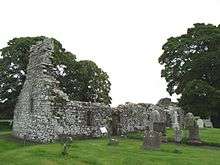Cannistown Church
| Cannistown Church | |||||||||||
|---|---|---|---|---|---|---|---|---|---|---|---|
|
Ardsallagh Church Kennastown Church | |||||||||||
| Teampall Bhaile Cheana | |||||||||||
 | |||||||||||
 Cannistown Church | |||||||||||
| 53°37′07″N 6°40′04″W / 53.618516°N 6.667914°WCoordinates: 53°37′07″N 6°40′04″W / 53.618516°N 6.667914°W | |||||||||||
| Location | Ardsallagh, Navan, County Meath | ||||||||||
| Country | Ireland | ||||||||||
| Denomination | Pre-Reformation Catholic | ||||||||||
| History | |||||||||||
| Dedication | Brigit of Kildare | ||||||||||
| Architecture | |||||||||||
| Style | Anglo-Norman | ||||||||||
| Years built | 12th century | ||||||||||
| Closed | 16th century | ||||||||||
| Specifications | |||||||||||
| Length | 22.85 m (75.0 ft) | ||||||||||
| Width | 7.25 m (23.8 ft) | ||||||||||
| Nave width | 5.45 m (17.9 ft) | ||||||||||
| Height | 7 m (23 ft) | ||||||||||
| Number of floors | 1 | ||||||||||
| Floor area | 57 m2 (610 sq ft) | ||||||||||
| Materials | sandstone, mortar, Old Red Sandstone | ||||||||||
| Administration | |||||||||||
| Diocese | Meath | ||||||||||
| |||||||||||
Cannistown Church is a medieval church and National Monument in County Meath, Ireland.
Location
Cannistown Church is located on the west bank of the Boyne, 4 km (2.5 mi) south of Navan. The Hill of Tara lies 5.8 km (3.6 mi) to the southeast.
History
Ardsallagh (Irish árd saileach, "height of willows")[1] is believed to be on the site of an early Christian monastery founded by Finnian of Clonard in the sixth century, known by various names: Escair-Branain (Brenan's ridge) Ard-bren-n Domnuich (Height of Brenan's church) or Airdleac (High stone). One hagiography claims that Saint Senach was educated by Finnian at Ardsallagh.[2]
Cannistown Church, dedicated to Brigit of Kildare, was probably built in the 12th century by the de Angulo / Nangle family, the Anglo-Normans to whom Cannistown was granted by Hugh de Lacy, Lord of Meath. It was the parish church from the 13th century onward, and was rebuilt in the 15th/16th century, but some original features remain, most notably the chancel. A church at "Ardsalach" is listed in the ecclesiastical taxation (1302–06) of Pope Nicholas IV. The church was closed around the time of the Reformation: in 1612, George Montgomery, Church of Ireland Bishop of Meath, described it as "in ruins."[3]
Church
The church consists of a nave and chancel with high gables, and the remains of a bell-gable in the west.[4] The arch leading into the chancel is of particular interest: Carved stones on each side of the arch show three dogs attacking an otter or fox, and another carving of three men, possibly depicting the Arrest of Jesus. There is a single lancet window and an ambry (recess for storing sacred vessels and vestments) at ground level on the north wall and a surviving lancet and piscina at the east end of the south wall. There is a small bullaun stone in the nave.[5]